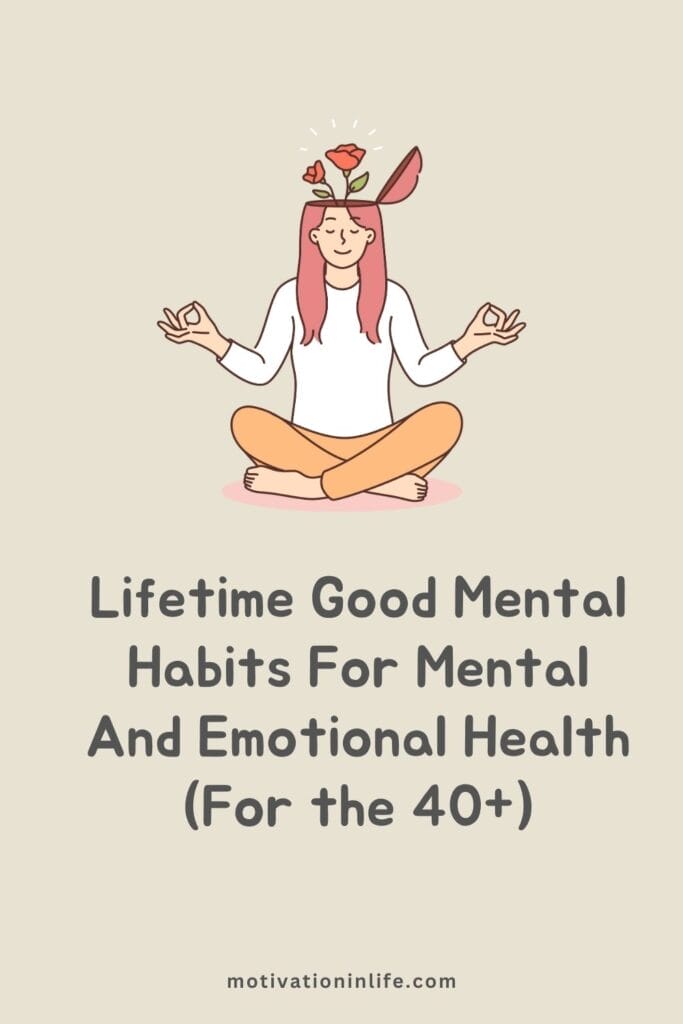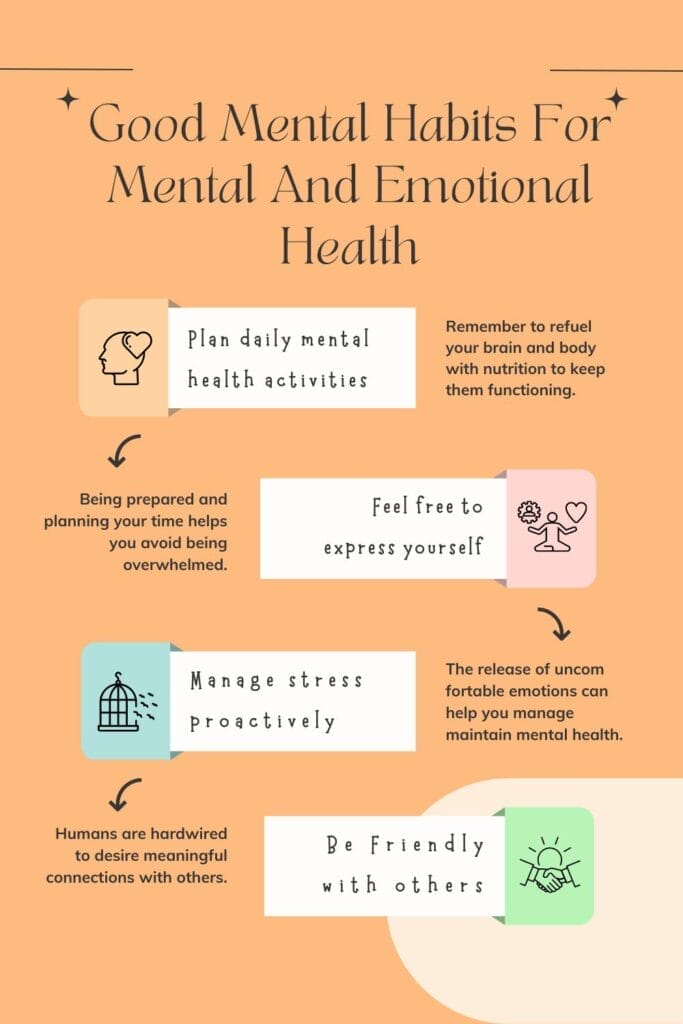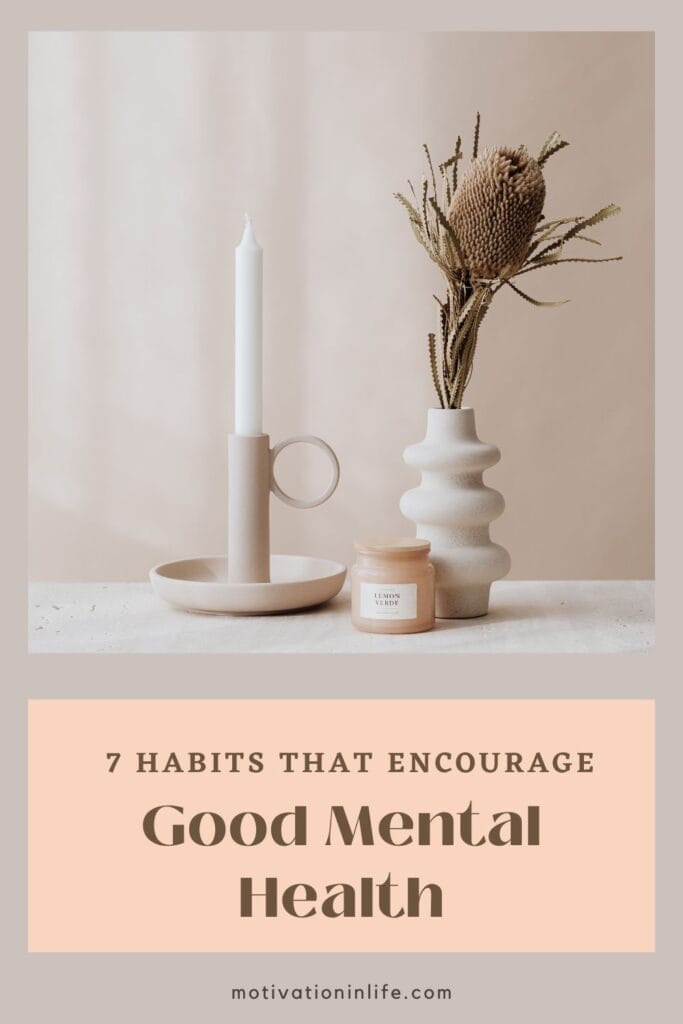Lifetime Good Mental Habits For Mental And Emotional Health (For the 40+)
“The Sum Of One’s Intelligence Is The Sum Of One’s Habits Of Mind.”
Lauren Resnick
Mental and emotional health are important aspects of your life that you should aim to maintain a balance in. Unfortunately, for many, this is easier said than done, especially as you age.
There are many good mental habits you can develop that will help you achieve and maintain a more balanced mental and emotional life.
To live a more balanced life as you reach your forties and beyond, it is important to first understand what that means for you. For some, having a more balanced mental and emotional life may mean finding more time for self-care and relaxation.
Others may find that they need to add more structure to their days or set clearer boundaries with others.
By the time you reach the golden years of 40 and above, the importance of good mental habits becomes more paramount. They are your shield against the vagaries in your life.
The most important thing is to figure out what habits work best for you and then commit to making small changes over time.
Table of Contents
AFFILIATE DISCLOSURE
This post may contain affiliate links. We may earn a small affiliate commission at no extra cost if you click on them.
motivationinlife.com is also a participant in the Amazon Services LLC Associates Program, an affiliate advertising program designed to provide a means for sites to earn advertising fees by advertising and linking to Amazon.com and Amazon.in
We may earn a small commission for our endorsement, recommendation, testimonial, and/or link to any products or services from this website.
10 Good Mental Habits To Develop Your Emotional And Mental Health In Life After 40

Why Is Good Mental Habits Important?
Mental health is just as important as physical health. Mental health is a vital part of your overall health. Good mental habits allow you to lead a fulfilled and peaceful life.
Children need to have good mental health during their childhood. Mental health is equally important for adults who need to be able to manage stress and stay focused on their work.
Good mental health is important for many reasons. It helps to cope with the stresses of everyday life. Further, it also makes it easier to make decisions and solve problems.
You can improve your mental health by adopting healthy habits such as
- eating right,
- exercising,
- getting enough sleep,
- avoiding or moderating alcohol or drug use,
- reducing stress through meditation or other activities like yoga or tai chi.
The benefits of good mental habits are not just for you but also for your family and friends because it will lead to a happier environment at home.
It also has an impact on society as a whole because people with good mental health are more empathetic and productive.
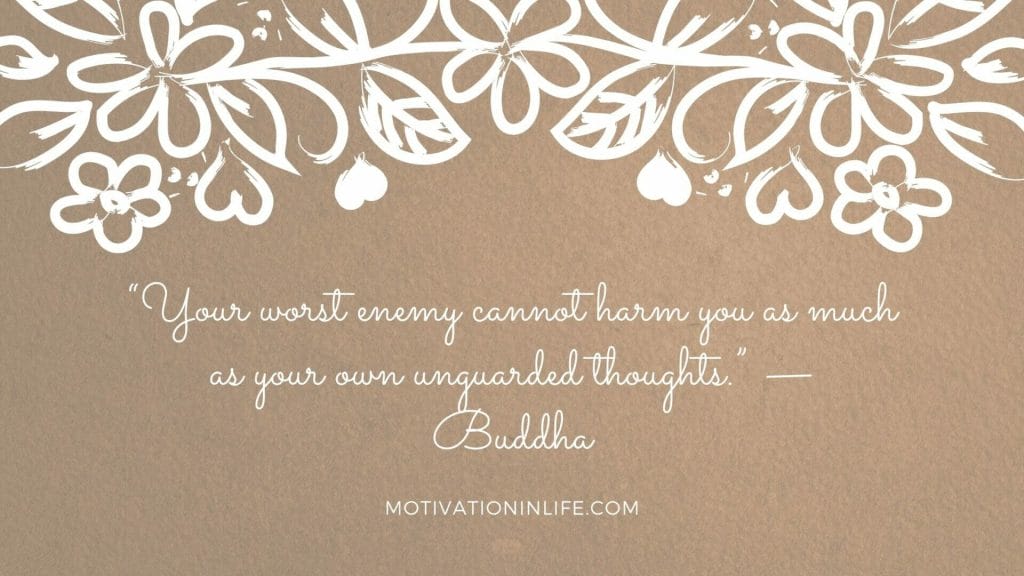
Why Should You Take Care Of Your Mental Health IN Midlife?
Though it is a fact that mental health is just as important as physical health, many people do not take care of their mental health in the same way that they take care of their physical health.
Mental health and physical health are interconnected. When one is not in good shape, the other usually suffers too. That’s why it’s so important to take care of your mental health. You need to be healthy in both body and mind!
Moreover, your mental health is also connected to your emotional health, and ignoring any of these can be detrimental to you, so it is in your interest to prioritize your mental health, especially in your midlife!
One of the best ways to take care of your mental health is by practicing self-care. You can use the free Self-Care Journal we have designed using the templates at Creative Fabrica to start planning on taking care of yourself today!!
How Do You Develop Good Mental Habits In MIDlife?
One of the most pertinent questions that comes to mind is how can I improve my mental and emotional health and develop good mental habits.
Mental health is a state of well-being in which an individual
- realizes his or her abilities,
- can cope with the normal stresses of life,
- can work productively and fruitfully,
- and can contribute to his or her community.
The term “mental health” was first used in the 1800s. People who have mental illnesses may need help from a therapist or counselor to manage their symptoms, which can include depression, anxiety, and suicidal thoughts.
There are many ways to take care of your mental health including exercise, time for yourself, and healthy habits like eating right and sleeping enough. All these things can improve your mood and make you feel better about yourself!
There is no one right way to look after your mental health, as everyone’s needs and preferences vary. But, there are a few key things that can help keep your mental well-being in good shape and help you get over your unhealthy mental habits.
In this blog post, we highlight some good mental habits that you can develop that will help you improve your quality of life and well-being.

7 Habits That Encourage Good Mental Health In Your 40s And Beyond
1. Get Enough Sleep
- Be aware of your sleep pattern.
- Realize how sleep and stress are interconnected.
- Get enough sleep.
- Sleep at the same time daily and wake up at the same time even on weekends.
- If you understand that there is a problem with your sleeping habit do not hesitate to consult your doctor.
Sleep is one of the most important aspects of your life, yet the most ignored. A good sleep helps you recharge and prepares you for the next day.
Sleep deprivation can hurt your mental health, leading to problems such as anxiety and depression.
It’s important to get enough sleep every night especially as you age, so that you can function at your best mentally physically emotionally.
2. Eat A Balanced Diet
- Add variety to the food you eat
- Stay hydrated throughout the day
- Include essential fatty acids like omega-3 fatty acids in your diet
- Ensure that you maintain a proper intake of calories as required by your body
There are a lot of talks these days about the benefits of a healthy diet for physical health. But, what about mental health? Eating a balanced diet is important for good mental health, too.
A balanced diet provides your body and brain with the nutrients they need to function properly. When you don’t get the nutrients you need, your body and brain can’t work as well as they should.
This can lead to various mental health problems like feeling low and stressed.
3. Exercise Regularly
- Develop an exercise routine that suits you.
- Stretch your body throughout the day.
- Exercise and spend time outside to get more vitamins
- Try aromatherapy, yoga, and other alternative therapies like Chakra healing which boost your physical and mental health.
It is no secret that exercise is good for the body. However, what many people do not know is that exercise is also good for the mind. Research has shown that regular exercise can be an effective way to improve your mental health.
There are many reasons why exercise is beneficial for mental health. For one, exercise releases endorphins, which are hormones that have mood-boosting effects. Exercise also helps to reduce stress levels and you can better control your mind.
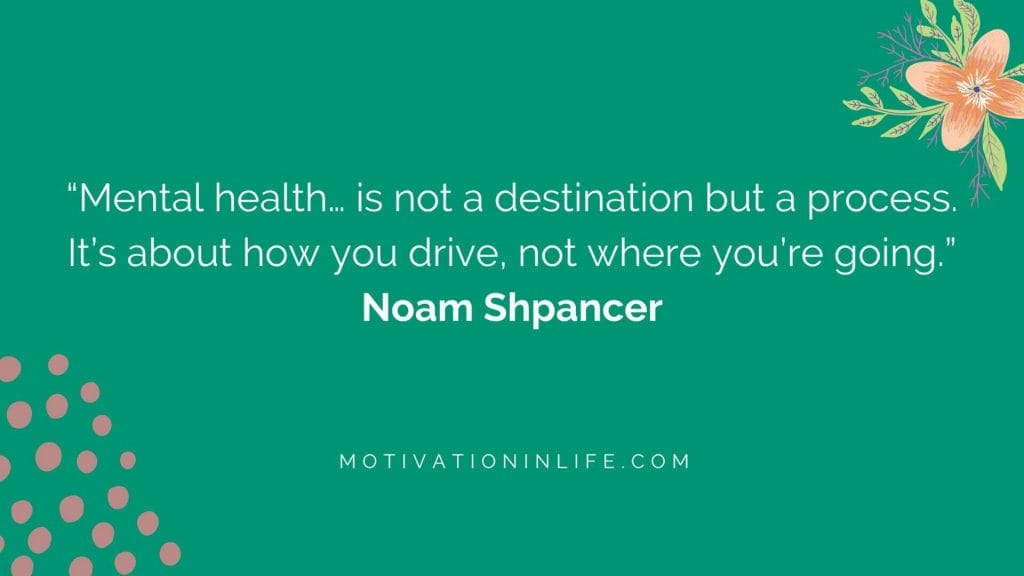
4. Connect With Loved Ones
- Meet with your loved ones once in a while.
- If meeting them is not possible, call them, and have video chats with them.
- Plan a holiday with your loved ones once a year.
- Create a core group in your life with whom you can share your ups and downs without any embarrassment.
Maintaining healthy relationships is important for a person’s overall well-being. According to the American Psychological Association, “connecting with loved ones is one of the most important things you can do for your mental health.”
Indeed, spending time with friends and family has been linked with lowered rates of depression, anxiety, and stress.
People often believe that to have good mental health, they must be alone. This is not the case. Connecting with loved ones is one of the most important things a person can do for their mental health.
Spending time with loved ones can help reduce stress, improve moods, and provide a sense of support. Additionally, being around loved ones can help increase feelings of happiness and satisfaction in life.
Connect with your school friends, college friends, your cousins with whom you share a special bond. It will help you beat loneliness in the later years of your life.
5. Find Purpose In Life
- Search for what gives meaning to your life.
- Understand your values and beliefs.
- Appreciate the goodness in you.
- Once you identify the purpose of your life, work towards fulfilling it.
Everyone needs a sense of purpose in life. A study published in the journal JAMA Psychiatry found that people who don’t have a sense of purpose are more likely to suffer from mental health problems.
Of course, finding a sense of purpose is easier said than done. It can take time and effort to find something that you’re passionate about and that gives your life meaning. But it’s worth the effort because having a sense of purpose is important for good mental health.
If you are still not sure of the purpose of your life read our blog post What Is My Life Purpose Quiz To Reinvent Yourself (For The 40+) and take the quiz in it to discover your calling in life!
6. Keep A Positive Outlook
- Start your day with positivity- think of the positive things in your mind.
- Be Grateful. Practice Gratitude Journaling.
- Laugh a lot.
- Forgive others.
A positive outlook on life is important for good mental health. It is essential to maintain a positive attitude during difficult times and to be able to find the good in every situation.
A positive outlook allows you to cope with stress and problems healthily. It also allows you to see the world in a more optimistic light, which can make life more enjoyable.
If your limiting beliefs are keeping you from being positive, please read our blog post Truth About What Are Limiting Beliefs And How To Identify Them (For The 40+), and overcome your negative thought patterns.
7. Take Breaks Throughout The Day
- Set up your clock so that you know that it is time for a break.
- Go for a short walk in the open to refresh your mind.
- Sip your favorite beverage while you take a break.
We all know that taking a break is important. Yet what many people don’t realize is that breaks should be taken throughout the day, not just at the end.
Recent studies have shown that good mental health depends on taking breaks throughout the day. When you work for hours on end without a break, your productivity decreases, and your stress levels increase.
It’s important to take a few minutes every hour or so to step away from our work and relax.
Taking breaks gives your mind a chance to rest and recharge. This allows you to be more productive when you return to your work.
There are many different ways to take breaks, so find what works best for you and make sure to use them regularly.
If you need to understand if you are making good use of your time throughout the day please read our blog post Answer Questions On Productivity To Manage Time Better (For The 40+). It will help you discover the areas you need to work on to increase your productivity.

How Do You Develop Emotional Health In Midlife?
The human mind is a complex, delicate thing. It can be affected by many things, including your stress levels and the mood you are in. Your emotional health is also something that you need to take care of and make sure that it is always in a good state.
To develop emotional health, it is important to understand what it is and how to achieve it. Emotional health is the ability to experience, express, and positively regulate emotions.
The ability to regulate one’s emotions is a critical life skill. Emotional health is not about being happy all the time. It is about being able to understand and manage your emotions healthily and developing good mental habits.
Emotional health is an important part of overall health and well-being. You must have a sense of self-awareness and understanding to maintain healthy emotional states.
There are many things you can do to develop and maintain your emotional health. Some common strategies and emotional health habits examples include exercise, relaxation techniques, and journaling.
Self-reflection is a great tool to introspect about your emotional well-being. Please read our blog post 10 Really Helpful Benefits Of Self-Reflection To Energize The Mind (For The 40+) to understand its importance.
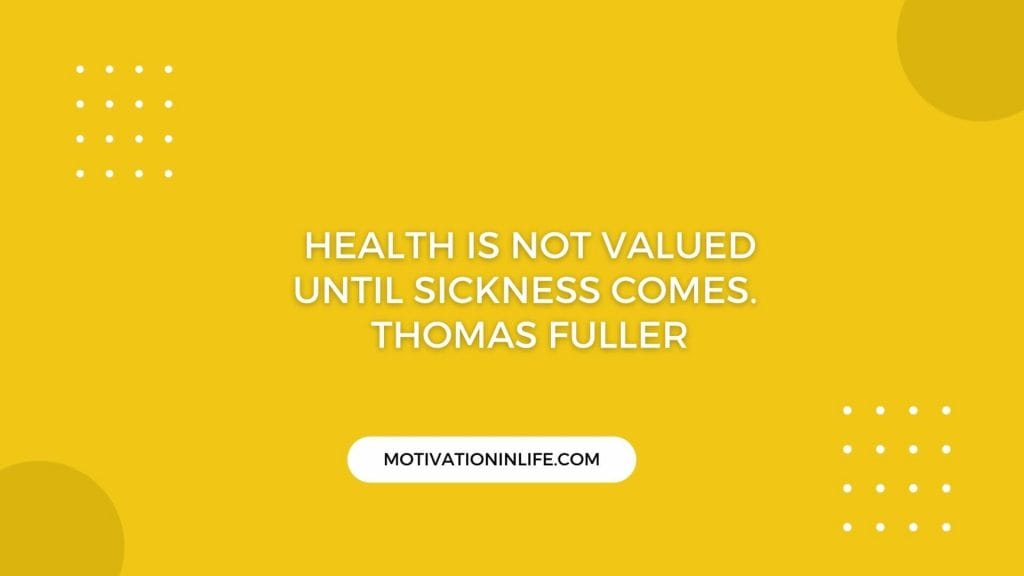
Good Habits Of Emotional Health For A stress-Free Second Chapter In Life
Emotional health is something that is often overlooked until it is too late. However, some good habits can be developed to help maintain emotional health. These can help you to improve your mood and reduce stress in your midlife.
11 Ways To Improve Your Emotional Health
Do Not Bottle Up Your Emotions
One of the most important things to remember is to not keep your emotions suppressed. If something is bothering you, talk to someone about it. Talking through your problems can help you to work through them and come up with a solution.
It is important to have and develop a support system. Everyone needs someone to rely on every once in a while.
For some, this support system is their family and friends. For others, this system may be their faith-based community or therapy.
Developing a support system for good emotional health is important for everyone, regardless of their circumstance. A support system can provide a sense of community, accountability, and hope during difficult times.
At times balancing my blogging life with my other activities gets stressful. In those times my blogging friends at the PIPS membership are my stress busters, They understand what I am going through, and venting out with them helps me feel relaxed and I can bounce back with a smile.
Be Conscious Of Your Emotional Self And Responses
Did you know that your emotional state has a direct impact on your physical health? The first step to good emotional health is being aware of your emotional self and how you respond to different situations.
Emotions are like a barometer, telling you what is going on inside your mind. When you are aware of your emotions, you can better manage them and stay emotionally healthy.
It is important to be patient with yourself, as everyone reacts differently to different situations. As you age, your emotional threshold reduces so you need to take care that you keep checking on your emotions regularly.
When you’re feeling good emotionally, you tend to have less pain and better overall health. Conversely, when you’re feeling down, anxious, or stressed, you’re more likely to experience pain and other health problems.
That’s why it’s important to be conscious of your emotional self and how you respond to events and situations.
If you feel that despite making the best effort you still lack the motivation to get going please read our blog post 15 Proven Tactics Of How To Get Motivation Back In Life (For The 40+)
Convey Your Feelings Appropriately To Others
When you interact with other people, it is important to express your feelings appropriately. If you suppress your emotions, they will eventually come out inappropriately.
This can lead to problems in your relationships with others, and it can also lead to problems with your mental health.
It is important to express your feelings in a way that is honest and that respects the feelings of the other person.
Explore Your Options Before Taking Any Action
It is often said that the first step to solving a problem is recognizing that there is one. For many people, this is easier said than done when it comes to emotional health.
It can be tempting to try and ignore your problems or push them to the side. But doing so will only make them harder to deal with in the long run.
So before doing anything in life, it is better to understand the pros and cons of an action. Then decide and choose the best option available.
Learn To Handle Your Stress
One in five Americans reports feeling extremely stressed. For some, this level of stress is a normal part of life. Yet, for others, chronic stress can lead to serious health problems.
Everyone at one time or another will feel stressed. It is a natural response to the demands of life. For some people, however, stress can become a regular occurrence, leading to health problems.
Learning how to handle your stress can help improve your emotional health and well-being. There are many things you can do to help manage your stress and live a healthier life.
If you are keen on learning about stress management, anxiety management, and emotional intelligence you can take courses on these topics on platforms like Udemy. You can also refer to sites like Lifehack which have enormous resources on issues related to mental wellness.
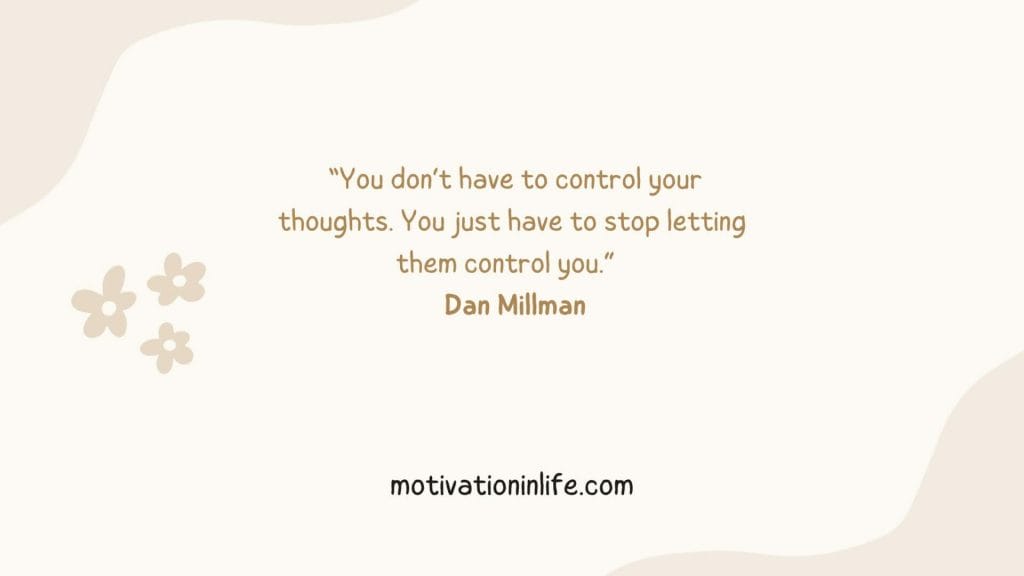
Aim For Balance In Life
Striving for a healthy balance allows for better emotional health and a more fulfilling midlife.
There are many ways to find balance, but it will be different for each individual. Some people may need more time for themselves while others may need more social interaction.
Achieving balance in life is essential for good emotional health. When your life is out of balance, you can feel uneasy, overwhelmed, and anxious. A few simple strategies can help you create a more balanced life.
- Start by identifying what is important to you and what brings you happiness.
- Make time for the activities that give you pleasure and relaxation.
- Include time for yourself in your schedule, and make sure that your day includes both work and leisure time.
- Take care of personal well-being
While it’s important to have goals and work towards accomplishments, it’s also crucial to maintain balance in life. Too much focus on work or other pursuits can lead to emotional instability and poor mental health.
It is important to take care of your well-being to maintain good emotional health.
It can be difficult to make time for yourself when you are busy. Yet, it is important to find ways to make yourself a priority. You will be able to better cope with the demands of your life if you take care of yourself both physically and mentally.
- Make time for yourself,
- Eat healthily
- Exercise, and
- Get enough rest
Try To Focus On Just One Thing. Avoid Multitasking
One of the best things you can do for your emotional health is to focus on just one thing. Trying to juggle too many things at once can lead to feeling overwhelmed and feeling burnt.
When you focus on just one thing, you can give it your undivided attention and let yourself get lost in it. This can be anything from reading a book to taking a walk in nature to spending time with friends and family.
Be The One To Help Others
Helping others is a great way to boost your emotional health. When you volunteer your time or resources to a good cause, you make the world a better place. In addition, you also get many mental health benefits in return.
Research shows that helping others can improve your mood, increase your sense of self-worth, and even reduce tension and anxiety.
So if you’re looking for a way to feel happier and healthier, consider lending a hand to someone in need.
Take A pause
When you are constantly on the go, it is easy to forget to take care of yourself. You push yourself to do more and more, often without taking a pause. But what you may not realize is that taking a pause is essential for your emotional health.
When you don’t take time for yourself, you can quickly feel overburdened. This can lead to negative emotions like anxiety and depression.
Studies have found that people who pause to reflect are more productive and mentally more resilient than those who do not.
Be Courageous
Courage is defined as having the strength to do something that frightens you. It’s not always about facing your fears head-on. Sometimes courage is simply being willing to feel the emotions that arise, even when they’re uncomfortable.
This kind of courage is essential for your emotional health. When you avoid feeling your feelings, they tend to build up. Later, they explode in some sort of emotional outburst.
Courage is not the absence of fear, but the ability to move forward in the face of fear. It is not always easy to be courageous, but it is worth it. Being courageous can lead to better emotional health which is essential for you as you cross your 40s.
If your fears are keeping you from reaching your full potential please read our blog post How To Reinvent Yourself By Eliminating Your Fears (For The 40+).

5 Characteristics Of An Emotionally Healthy ADULT
- Can regulate his emotions in healthy ways.
- He is not always happy, but he can constructively cope with difficult emotions.
- He has a good sense of self-awareness and knows his strengths and weaknesses.
- He also has a good sense of empathy and can put himself in other people’s shoes.
- Lastly, he has realistic expectations for himself and others.
A person is considered to be emotionally stable if they are confident in themselves, have a positive outlook on life, and maintain healthy habits.
The more you practice these habits, the more you will feel happier and less worked up.
Small Habits To Improve Mental Health In Life After 40
Did you know that there are small habits that you can practice every day to improve your mental health?
Some of these habits that do not require much effort but can be tremendously beneficial are
- Practicing Self-care
- Enjoying laughing
- Eating, exercising, and sleeping well
- Learning to stay positive
- Appreciating your surroundings
While mental illness can be a serious issue, there are many things that you can do to improve your mental health and protect yourself from developing a mental illness.
Taking care of yourself is one of the best habits you can inculcate to strengthen your mental well-being. Please read our blog post Simple Self-Care Practices For Impactful Positive Change In Life (For The 40 +), if you want to increase focus on yourself in midlife.
10 Good Habits To Develop Your Mental and Emotional Health In Midlife
We have already talked about the habits that you need to develop mental and emotional health but what are those habits that will allow you to improve mentally and emotionally?
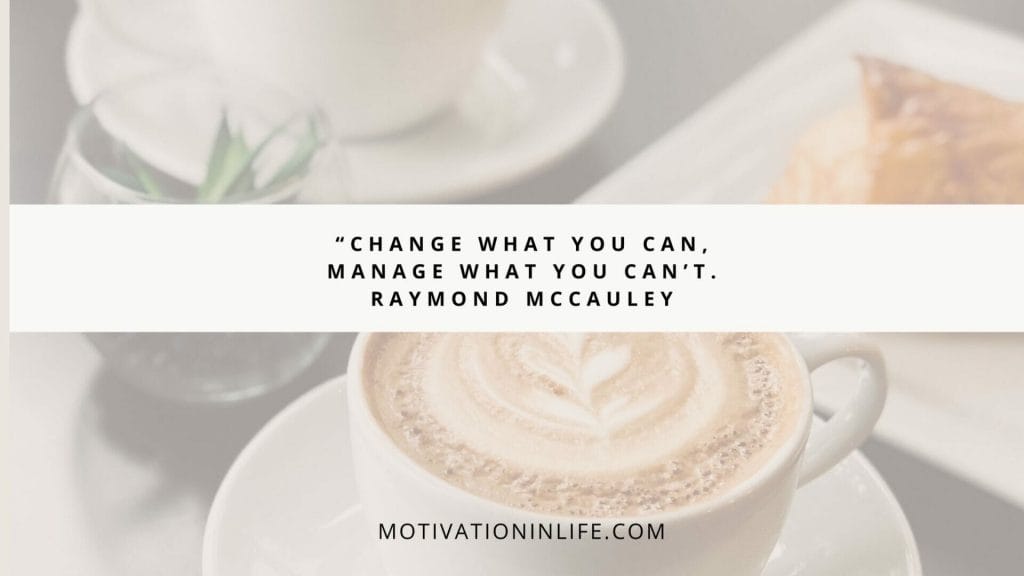
Here Are 10 Good Mental Habits To Get Started
- Accept your thoughts and feelings
- Connect with people of your age group
- Meditate
- Be patient with yourself
- Take care of your body
- Be Grateful for the things In your life
- Be physically and mentally active
- Find something you’re passionate about
- Connect with nature
- Love Yourself
It’s no secret that your mental and emotional health are closely intertwined. Just as you need to take care of your physical health by exercising and eating right, you also need to take care of your mental and emotional health by developing healthy habits.

Good Mental Habits: Key takeaways
Developing good mental habits and healthy habits will go a long way in improving your emotional and mental health as you move through your midlife.
Not only will you develop the right mindset, but you will also be more productive and have better overall physical health. So, commit yourself to developing some healthy habits today!
If you are struggling with emotional or mental health issues, please seek professional help. There is no shame in getting the support you need to get your life back on track.
By following the simple tips listed in this article, you can start making positive changes in your life today.
We hope you liked the ideas given in this blog post for good mental habits. If so you may also browse through our blog post on tips to develop positive habits and how to set simple life goals to achieve your dreams.
Recommended Books That Help In Improving Mental Resilience In Midlife
Self-Compassion: The Proven Power of Being Kind to Yourself By Dr. Kristin Neff (Amazon.com | Amazon.in)
Dare: The New Way to End Anxiety and Stop Panic Attacks By Barry McDonagh (Amazon.com | Amazon.in)
IF YOU ENJOYED READING THIS POST, PLEASE PIN ONE OF THESE IMAGES BELOW!
I will be grateful for your kind gesture. Thank you!
